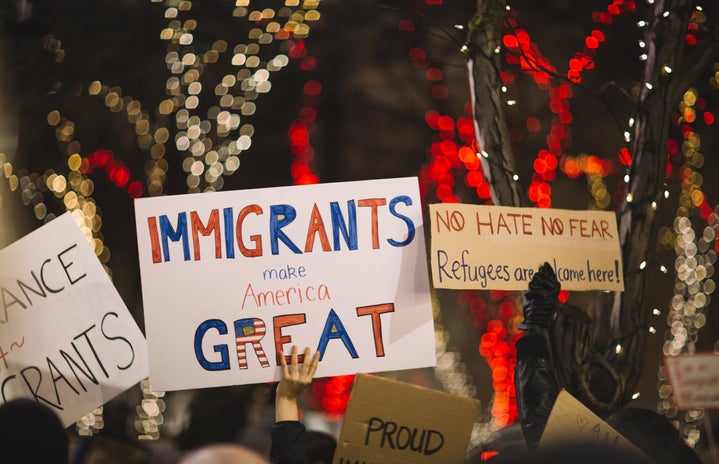Immigration and Customs Enforcement, otherwise known as ICE, functions as the nation’s law enforcement agency for undocumented individuals under the Department of Homeland Security. The conversation surrounding the movement to abolish ICE has arisen in recent years primarily due to the president’s decision to deport significantly more non-criminal, undocumented individuals residing in the United States than previous administrations; Donald Trump’s executive order more than doubled these deportations in the 2017 fiscal year compared to the previous year. Alexandria Ocasio-Cortez’s rallying cry against ICE after her 2018 election to Congress shed light on the movement in general, discussing the inhumane nature of many deportations and the lack of a fair system to ensure security and safety for those who are undocumented. There has not been a consensus among the left as to whether or not abolishing ICE means restructuring the current system or completely overhauling immigration law to create comprehensive reform; however, the sentiment remains that the current immigration policies are violating human rights and creating some of the most egregious moral faults in the United States today, including the increasingly common separation of families, the imprisonment of children in cages, and the deaths of detained individuals. As a part of this conversation, Bernie Sanders ran on a particularly progressive immigration platform for the 2020 Democratic presidential nomination, promising comprehensive reform and the decriminalization of undocumented border crossing. Perhaps most importantly, Sanders wanted to eliminate the deportation of undocumented individuals who resided in the United States for five or more years.

In his 2020 election platform, Joe Biden addresses the “moral failings” of the current system — among them, children dying in detention centers, the separation of families, and battles over whether or not those in detention centers should be provided basic human needs. Unlike Sanders, Biden has not explicitly supported the abolition of ICE, but he does back plans to restructure the mechanisms on which ICE currently operates. Returning to past precedent, Biden plans to significantly reduce the deportation of undocumented individuals without a criminal background. He also emphasizes his desire to ensure that those seeking asylum in the United States can do so more easily and with fewer restrictions on their qualifications for seeking asylum (for example, considering persecution on the basis of sexuality a legitimate reason for seeking asylum, which the Trump administration has made significantly more difficult). Additionally, the Biden platform wishes to add humanitarian aid to the border region, end prolonged detention of individuals, and protect DACA. The end goal of the Biden platform is to expand opportunities for legal paths to citizenship in the United States, regardless of how an individual arrived within its borders. Kamala Harris (the VP Democratic nominee) also has been vocal about her support to completely reconstruct immigrations and customs enforcement in the United States, but like Biden, has not supported the outright abolition of ICE as it currently exists.
Unsurprisingly, the abolition of ICE connects to the movement to defund the police. Both are rooted in the understanding that the United States creates and engages in law enforcement systems designed to oppress certain groups, utilizing force and incarceration instead of physical and mental health resources and government assistance. Silky Shah, director of Detention Watch Network, stated that the police and ICE are “built on the same foundation of racism and white supremacy.” ICE and the police often work together to identify and arrest individuals residing in the United States without documentation, creating a united culture against certain racial and ethnic groups. Sanctuary cities bar local law enforcement from assisting ICE in arrest and deportation proceedings through the release of information or the change of custody unless an individual has already been convicted of a crime in most cases. The Trump administration has cracked down on sanctuary cities around the country for these particular policies, leading to a continued legal debate throughout Trump’s presidency.

Voting this November holds more weight than it has in some past elections due to a variety of issues, and the future of immigration policies with direct ties to human rights will prove an important consideration. While Sanders’ abolition of ICE represents the most progressive and extensive policy platform to date, the Biden-Harris ticket also endorses critically important new systems that minimize the opportunity for oppression and targeting of undocumented residents of the United States and would dramatically improve the lives and safety of America’s undocumented population. Biden noted in his immigration platform that “unless your ancestors were native to these shores, or forcibly enslaved and brought here as part of our original sin as a nation, most Americans can trace their family history back to a choice – a choice to leave behind everything that was familiar in search of new opportunities and a new life.” While immigration and documentation may not seem like a personal issue to all, your very ancestry indicates that it more than likely was a personal issue to your family not so many years ago. So, vote like you’re an immigrant — or like your family, friends, and classmates are not documented — and understand that your vote has very real consequences for the future of America’s undocumented and immigrant populations.


